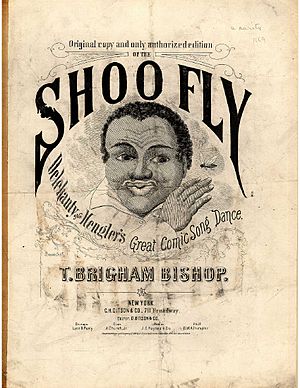Shoo Fly, Don't Bother Me facts for kids
"Shoo, Fly, Don't Bother Me!" is a very old and popular song from the 1860s. It was sung by soldiers during the Spanish–American War in 1898. At that time, flies and mosquitoes carrying yellow fever were a big problem for the soldiers. Later, famous singer Bing Crosby included the song in his album Join Bing and Sing Along in 1959. Today, many children sing this song. It has been featured on many children's music albums, including Disney Children's Favorite Songs 3. On that album, it was performed by Larry Groce and the Disneyland Children's Sing-Along Chorus.
How the Song Was Made
The exact start of "Shoo Fly" is a bit of a mystery. An old newspaper article from 1895 talked about its history. It suggested the song might have come from Panama. People there sang similar phrases while working.
A performer named Helon Johnson is said to have brought a version of the song to California. Other singers then changed and performed it. A group called Bryant's Minstrels helped make the song very famous around 1869-1870. They added a special dance to it.
Who Wrote "Shoo Fly"?
Many people have claimed to write "Shoo Fly." One person was Thomas Brigham Bishop, who also claimed to write "John Brown's Body." Bishop said he wrote "Shoo Fly, Don't Bother Me" during the American Civil War. He was in charge of a group of soldiers. One day, a soldier said, "Shoo fly, don't bother me!" This gave Bishop the idea for the song. He even put his unit's name, "Company G," in the lyrics. Bishop published his version of the song in 1869. He said it was the "Original Copy and Only Authorized Edition."
Other people also claimed to be involved. Some sources say Billy Reeves wrote the words and Frank Campbell wrote the music. Another person, Rollin Howard, also had a part in arranging an early published version of the song.
Song Lyrics
The words to "Shoo, Fly, Don't Bother Me!" are very well-known. They are now in the public domain, meaning anyone can use them.
Shoo, fly, don't bother me,
Shoo, fly, don't bother me,
Shoo, fly, don't bother me,
For I belong to somebody.
I feel, I feel, I feel like a morning star,
I feel, I feel, I feel like a morning star.
Oh, shoo, fly, don't bother me,
Shoo, fly, don't bother me,
Shoo, fly, don't bother me,
For I belong to somebody.
Today, usually only the chorus of the song is sung. Some of the older parts of the song are not used anymore.
 | Aaron Henry |
 | T. R. M. Howard |
 | Jesse Jackson |


